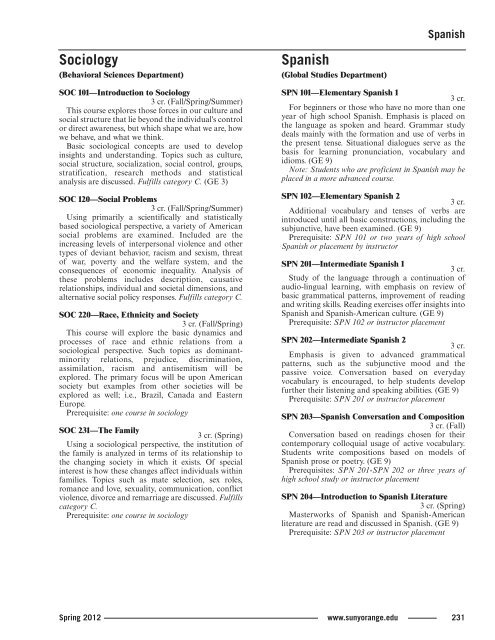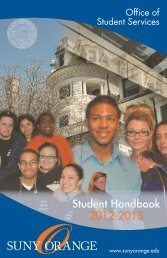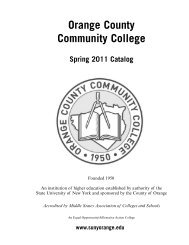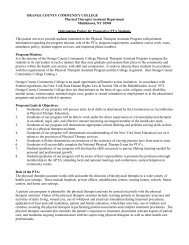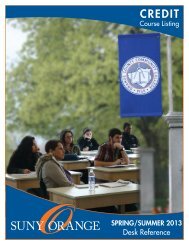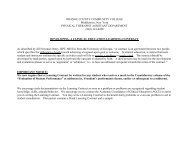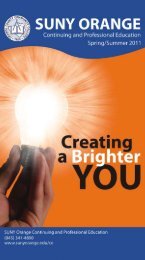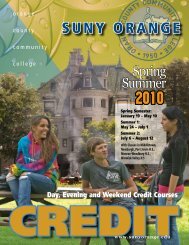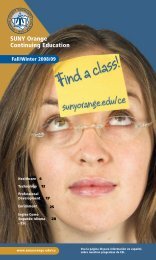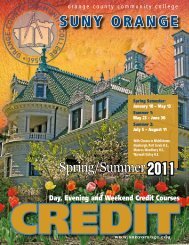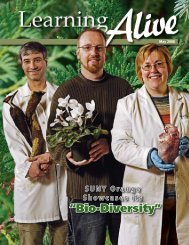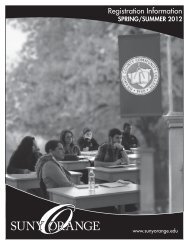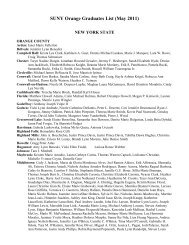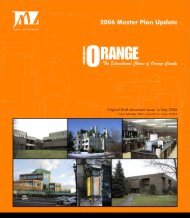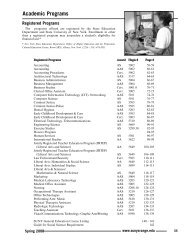You also want an ePaper? Increase the reach of your titles
YUMPU automatically turns print PDFs into web optimized ePapers that Google loves.
Spanish<br />
Sociology<br />
(Behavioral Sciences Department)<br />
SOC 101—Introduction to Sociology<br />
3 cr. (Fall/Spring/Summer)<br />
This course explores those forces in our culture and<br />
social structure that lie beyond the individual's control<br />
or direct awareness, but which shape what we are, how<br />
we behave, and what we think.<br />
Basic sociological concepts are used to develop<br />
insights and understanding. Topics such as culture,<br />
social structure, socialization, social control, groups,<br />
stratification, research methods and statistical<br />
analysis are discussed. Fulfills category C. (GE 3)<br />
SOC 120—Social Problems<br />
3 cr. (Fall/Spring/Summer)<br />
Using primarily a scientifically and statistically<br />
based sociological perspective, a variety of American<br />
social problems are examined. Included are the<br />
increasing levels of interpersonal violence and other<br />
types of deviant behavior, racism and sexism, threat<br />
of war, poverty and the welfare system, and the<br />
consequences of economic inequality. Analysis of<br />
these problems includes description, causative<br />
relationships, individual and societal dimensions, and<br />
alternative social policy responses. Fulfills category C.<br />
SOC 220—Race, Ethnicity and Society<br />
3 cr. (Fall/Spring)<br />
This course will explore the basic dynamics and<br />
processes of race and ethnic relations from a<br />
sociological perspective. Such topics as dominantminority<br />
relations, prejudice, discrimination,<br />
assimilation, racism and antisemitism will be<br />
explored. The primary focus will be upon American<br />
society but examples from other societies will be<br />
explored as well; i.e., Brazil, Canada and Eastern<br />
Europe.<br />
Prerequisite: one course in sociology<br />
SOC 231—The Family<br />
3 cr. (Spring)<br />
Using a sociological perspective, the institution of<br />
the family is analyzed in terms of its relationship to<br />
the changing society in which it exists. Of special<br />
interest is how these changes affect individuals within<br />
families. Topics such as mate selection, sex roles,<br />
romance and love, sexuality, communication, conflict<br />
violence, divorce and remarriage are discussed. Fulfills<br />
category C.<br />
Prerequisite: one course in sociology<br />
Spanish<br />
(Global Studies Department)<br />
SPN 101—Elementary Spanish 1<br />
3 cr.<br />
For beginners or those who have no more than one<br />
year of high school Spanish. Emphasis is placed on<br />
the language as spoken and heard. Grammar study<br />
deals mainly with the formation and use of verbs in<br />
the present tense. Situational dialogues serve as the<br />
basis for learning pronunciation, vocabulary and<br />
idioms. (GE 9)<br />
Note: Students who are proficient in Spanish may be<br />
placed in a more advanced course.<br />
SPN 102—Elementary Spanish 2<br />
3 cr.<br />
Additional vocabulary and tenses of verbs are<br />
introduced until all basic constructions, including the<br />
subjunctive, have been examined. (GE 9)<br />
Prerequisite: SPN 101 or two years of high school<br />
Spanish or placement by instructor<br />
SPN 201—Intermediate Spanish 1<br />
3 cr.<br />
Study of the language through a continuation of<br />
audio-lingual learning, with emphasis on review of<br />
basic grammatical patterns, improvement of reading<br />
and writing skills. Reading exercises offer insights into<br />
Spanish and Spanish-American culture. (GE 9)<br />
Prerequisite: SPN 102 or instructor placement<br />
SPN 202—Intermediate Spanish 2<br />
3 cr.<br />
Emphasis is given to advanced grammatical<br />
patterns, such as the subjunctive mood and the<br />
passive voice. Conversation based on everyday<br />
vocabulary is encouraged, to help students develop<br />
further their listening and speaking abilities. (GE 9)<br />
Prerequisite: SPN 201 or instructor placement<br />
SPN 203—Spanish Conversation and Composition<br />
3 cr. (Fall)<br />
Conversation based on readings chosen for their<br />
contemporary colloquial usage of active vocabulary.<br />
Students write compositions based on models of<br />
Spanish prose or poetry. (GE 9)<br />
Prerequisites: SPN 201-SPN 202 or three years of<br />
high school study or instructor placement<br />
SPN 204—Introduction to Spanish Literature<br />
3 cr. (Spring)<br />
Masterworks of Spanish and Spanish-American<br />
literature are read and discussed in Spanish. (GE 9)<br />
Prerequisite: SPN 203 or instructor placement<br />
Spring 2012<br />
www.sunyorange.edu<br />
231


